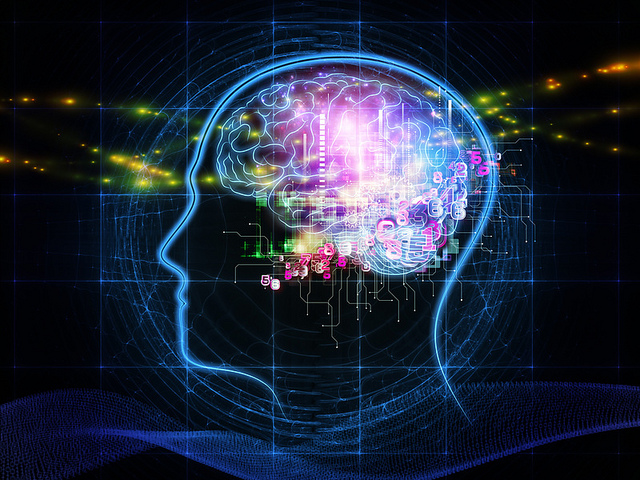The newly discovered brain lymphatic channels called “glymphatics” drain about three pounds of toxins from the brain each year—that’s about the weight of the entire brain in toxins dumped each year.
The most well-known of these brain toxins is the infamous beta-amyloid plaque that is linked to serious cognitive decline as we age (1).
The understanding of the function of these lymphatics is opening the doors to therapies for the brain that are brand new…or are they?
This discovery was made in 2015 and, before that, the scientific community agreed that the brain and central nervous system were devoid of lymph.
Ayurveda, on the other side, suggested that there were important brain drainage channels in the sagittal sinus in the top of the skull. The sagittal sinus tracks the pattern of a Mohawk haircut. See the image from the original study that discovered the glymphatics (1).
The picture on the left is an illustration of the lymph before this discovery, and on the right, the new lymphatic system diagram. Notice the Mohawk pattern.
According to Ayurveda and now emerging western science, these brain lymphatics are linked to a host of health concerns including mood, energy, memory, brain fog and many other chronic degenerative health concerns. These are the drains of the body, and we are only beginning to understand how they work.
The lymphatic system, including the glymphatics, is by far the largest circulatory system of the body. According to western science, the lymphatic system starts inside the finger-like projections called villi that line the intestinal wall.
According to Ayurveda, the lymphatic system is stimulated when we first see, smell, touch or taste our food. This triggers the release of a pre-lymph fluid, called “sara” in Ayurveda, in the mouth and upper digestion. This pre-lymph fluid is emotionally-charged by the attitude, feelings and emotions that were experienced while eating the food.
We now know that the microbes that are in the mouth, esophagus, stomach and intestines can feel and will respond to emotional stress (2). So how you eat the food, which was a fundamental principle in digestive health in Ayurveda, is now new emerging and exciting science.
Ayurveda also said that the emotional state of eating the food will affect the health of the body on a cellular level—mentally, physically and emotionally. The emotionally-charged microbes are now being understood to do exactly that—either improve or hinder the health, longevity and happiness of the human body. Eating angry, on the run or while stressed is a major violation to digestive health, according to Ayurveda (2,3)
Once the pre-lymph fluid reaches the stomach, it is called “ahara rasa,” which is the food and lymph mixture that will become the digested nutrients and toxins to be processed. When foods, toxins or fats are too large to be picked up by the bloodstream, they are swept up by intestinal villi and routed into small channels in the lymphatic system, called lacteals (4).
Once these particles enter the lymphatic system, they are scrubbed for undesirable bacteria by the immune system with an army of lymph-based white blood cells (WBCs). While there is some breaking down of toxins and digesting taking place in the lymph, these functions are limited. The main function seems to be a delivery system for digested fats to be used as fuel, to escort toxins to the blood where the liver can process them, and protect the body from bacteria and viruses (4).
How many of these large, undigested particles enter the lymphatic system is dependent on the efficiency of the upper digestive system and the quality of foods that we eat. Processed foods, non-organic foods that are laced with pesticides and chemicals, and even the emotional impact on the microbiology from stress all play a role in how well we digest our food.
As a result of poor upper digestive strength and the resultant damage and inflammation of the intestinal skin, the lymphatics can become congested. First, the lymph congests around the intestines, but soon, the entire lymphatic system will compensate for the intestinal lymph congestion. The result can be poor brain, skin or respiratory lymph drainage, or compromised lymph drainage from every cell or any organ of the body. The lymph is pervasive and touches every cell and organ in the body.
In my free podcast, The Brain-Lymph Connection (For Better Mood and Memory), I will take you step-by-step through how to ensure the best lymphatic drainage possible, based both on the current science and the ancient Ayurvedic wisdom.
References:
- http://www.nature.com/nature/journal/v523/n7560/full/nature14432.html
- http://www.ncbi.nlm.nih.gov/pmc/articles/PMC3788166/
- http://www.ncbi.nlm.nih.gov/pmc/articles/PMC4290626/
- http://www.ncbi.nlm.nih.gov/pmc/articles/PMC3064563/
~
Author: Dr. John Douillard
Editor: Sara Kärpänen
Photo: Health Blog / Flickr


 Share on bsky
Share on bsky





Read 0 comments and reply